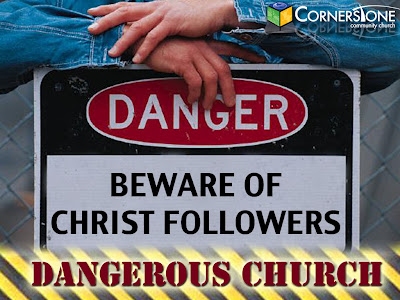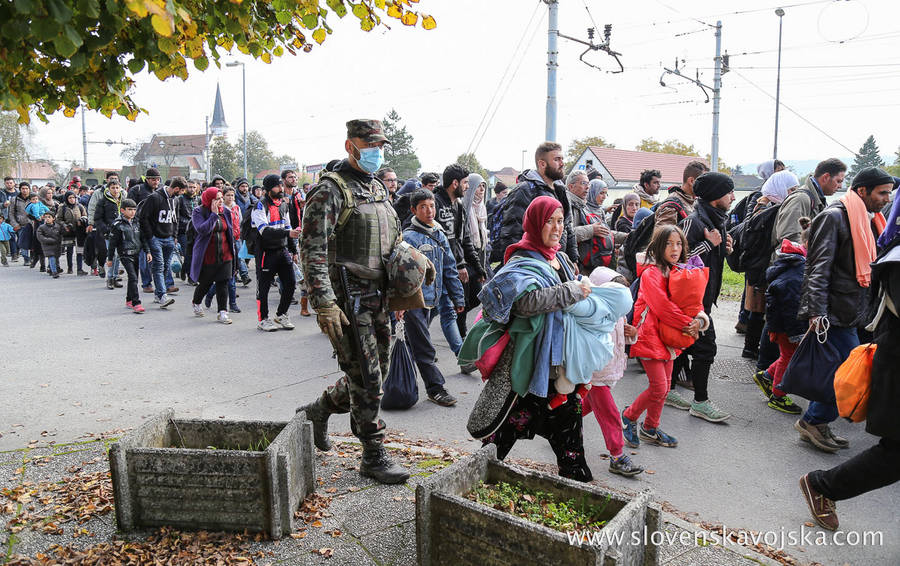Should We Be Dangerous?

Should Christians be dangerous? Is following Christ safe? Do you really think that the safest place to be is in the center of God’s will? For the next two weeks I will be preaching a mini-series on being dangerous. The main inspiration for this series comes from a book I read by Erwin McManus entitled The Barbarian Way: Unleash the Untamed Faith Within
I listened to a similar series by Craig Groeschel at Lifechurch.tv as well. I keep coming back to the fact that we have sanitized and polished the Christian faith. We have forgotten the cost, the risk, the sacrifice to following Christ. Instead of being part of a safe, comfortable, predictable church, I want to be part of a dangerous group of Christians boldly following Christ. How about you?
While I have been planning the message, the song Dangerous by Decemberadio keeps playing in my head. I’ll just keep it cranked up while working on the sermon. Here are the lyrics to the chorus
I wanna be Dangerous
unashamed to proclaim your name
I wanna be Dangerous
I can’t hide or deny what’s inside
I wanna be Dangerous







Please define “dangerous”.
Do you mean this as a slick term to market Christianity as exciting to youth culture?
Or do you mean using Jesus Christ’s message of love and spiritual purity as an excuse to engage in acts of violent bigotry against non-Christians?
Or do you mean being courageous enough to live peacefully with people of other faiths, and of no religious faith…to be secure enough in our beliefs, to have enough faith in love and in people that we needn’t feel the need to claim superiority and persecute them…to vow to use our faith as inspiration to perform charity and expect nothing in return, not even reward in Heaven, as Jesus did?
Or do you mean something else? Please explain.
Nicole, thanks for the comment. I can tell from your question that you have probably experienced Christians acting in an un-Christlike way. I want to apologize if that is the case. I encourage you to listen to the audio message that this post is based on. Here is what I mean by this post.
Too many times Christians look to church as a shelter from the world, instead of a shelter for the world. Living dangerously means that we become the hands and feet of Jesus and take a message of hope, love, and forgiveness to those outside of the church.
Instead of having a “safe” church that only does activities and events to keep people happy within the church, we want to be a church that really cares about the community and world that we live in. At the same time, we realize that Jesus not only met physical needs, but that he met Spiritual needs as well. Do we live peacefully with people of other faiths? Absolutely, but that doesn’t mean that we don’t share the faith, hope, and love that we have in Christ. We want to be bold and realize that there is nothing comfortable or safe about living out our faith. It is not slick marketing to say that the Christian life should be exciting, that is reality.
Here are a few examples of how that looks at Cornerstone
-we paid for a church in Nicaragua, one of the poorest countries in Central America. We paid for the building and for a full-time pastor there. We have also sent several teams there to hand out food and share the love of Christ to the surronding villages.
-we gave away our offering one morning to everyone in the church so that they could be a blessing to someone in their life. This was simply to show Christ’s love to our community. It wasn’t about “slick” marketing or building the church, it was simply to show love
-we are moving into a rented building in our downtown area that we can use throughout the week to reach out to our community. We are in an area that has high unemployment and high poverty levels, and we want to do everything we can to make a difference.
Safe churches are comfortable churches. Dangerous churches are churches that aren’t afraid to be who God has called them to be. Real, authentic, passionate, and loving.
Thank you for your thoughtful reply, Mike. It is true that my experience with Christians has been mixed. I am aware that a large portion, perhaps even a majority, of charity in the USA is done by church-affiliated groups, but have had largely negative experience with most church groups’ prejudice against non-Christians, and gay and women’s equality. I find it a difficult issue to reconcile in my own mind — so many people doing good work, but in such a conditional way as to be actively destructive to others. Of course, there are many flavors of Christianity, and so it comes down to each individual group and person. I have known Christians who are genuinely lovely people, too.
It’s interesting and gratifying to see the work you are doing, and how it mirrors the mission of a secular group I’ve associated with, Burners Without Borders http://burnerswithoutborders.org.
Our belief system is fundamentally different in that subscription to any particular doctrine is not a requirement for participation. believe in our calling to help as simply coming from being human, rather than being directed by a divine being. But our actions are very similar, and that is heartening to me. Burners who are volunteering in disaster-relief efforts (in Mississippi post-Katrina, and currently in Peru, post-earthquake) have worked side-by-side with church groups, as well. There is no doubt that various churches do amazingly compassionate humanitarian relief work, all around the world.
I have to admit, however, that I do not understand why it seems that Christians in general don’t believe that charity can’t be given without missionary rhetoric. The message that non-religious people get is that you believe that people cannot understand love, cannot act in love, without attributing it to Jesus Christ, without learning it from the Bible.
I have a hard time with the fact that many (most?) Christians, even when they tolerate other faiths — including non-theistic ones — don’t truly respect them, do not truly acknowledge that love, from any source is equal. Can there be peace and prosperity for all without equality? Can you, as a Christian, really love someone who does not share your faith, and never will? Do you believe in the existence of love in the absence of believe in the Christian doctrine?
I ask these questions sincerely, and mean no disrespect. I am trying to conquer my own prejudice against the negative Christians I have met, the ones that, even in the midst of doing good works, deny my gay friends their rights to exist in love and peace, deny me the right to make sexual and reproductive decisions about my own body, the ones who use their faith as a weapon against those who live differently from them. I’m trying to get past the somewhat over-dramatized negativity in the media regarding the religious divide and open my mind, and have dialogs with more thoughtful religious people, like yourself.
Thanks again for your comment. I’ve enjoyed this discussion. I again feel that you have probably encountered some Christians who have shared their beliefs in an angry and confrontational way. We do live in a society of many different beliefs, and as Christians we are called to love everyone. We can show that love through our example and through our compassionate and loving discussions with those who may not believe the same as ourselves.
We are called to be witnesses for Christ, not defense attorneys. We should tell others what we have seen, heard, and experienced, but we should not enter into arguments and debates that do nothing but turn people against the Christ we represent.
I think words like tolerance and respect have really changed in our modern society. Christians are expected to not just tolerate and respect people of other faiths, but they are expected to agree with and accept people of different faiths.
The analogy that I think of is this: If I invent the cure for cancer, would I share it with the world? If it could save your life, should I share? Even if you may not like how it works, even if you may not agree with the method, I still feel obligated to share. It is my responsibility to do that in such a way that you see my love and compassion.